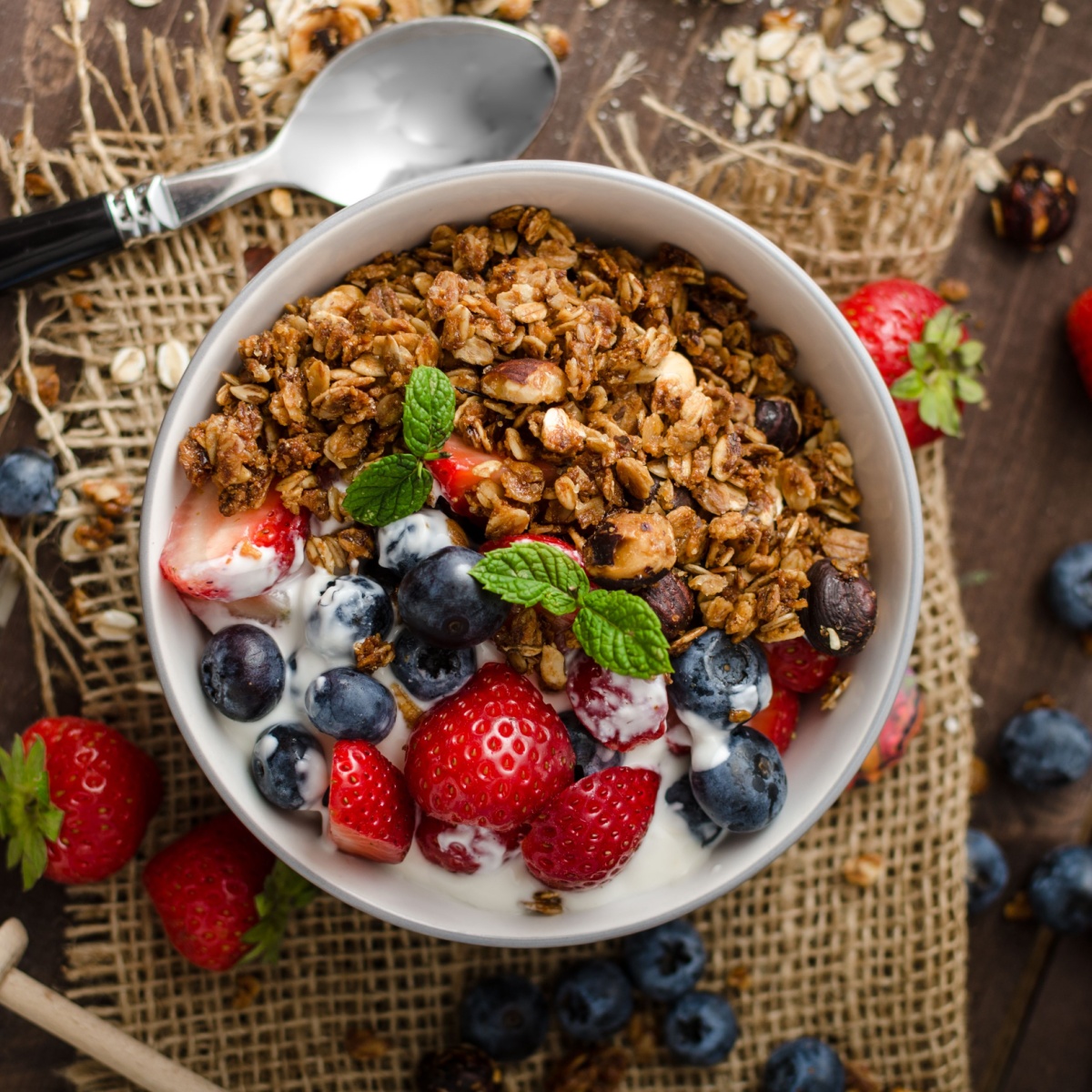
1. Commercial Granola
While granola is often perceived as a healthy breakfast choice due to its whole grain oats and nut content, it can actually contribute to bloating and gut issues for some individuals. Many store-bought granolas are loaded with added sugars and unhealthy fats, which can disrupt digestive function and lead to discomfort.
Derrick elaborates on why this healthy breakfast can be so hard to digest for certain people. "Granolas market themselves as the wholesome, fiber-rich option. But most commercial granolas are also loaded with added sugars and hard-to-digest nuts and seeds that can seriously mess with sensitive stomachs. I've had more than a few rough roll sessions thanks to that combination!" Noted.
2. Smoothies/Juices
Consuming large quantities of sugar in liquid form can lead to spikes in blood sugar levels, followed by crashes, which may disrupt digestion and leave you feeling bloated or sluggish.
Additionally, smoothies and juices often lack the fiber found in whole fruits and vegetables, which is essential for promoting healthy digestion and preventing constipation.
Too much of a certain food can sometimes have its downsides, as Derrick says, "Another culprit is smoothies or juices with lots of greens like kale, spinach or celery," she adds, "Don't get me wrong - I'm all about getting those nutrient-dense veggies in. But blending them on an empty stomach first thing in the morning is just asking for painful gas and bloating until those tough-to-break-down fibers can get properly digested."
3. Overnight Oats
One potential culprit here is the high fiber content of oats, which, while beneficial for many, can be challenging for some digestive systems to process, particularly if consumed in large quantities or if not adequately soaked or cooked.
Furthermore, certain toppings commonly used in overnight oats, such as dried fruits and nuts, can be difficult to digest for individuals with sensitive stomachs or those prone to bloating.
Overnight oats have been going viral all over the internet thanks to their versatility and convenience, but Derrick reveals, "While oats themselves are great, soaking them can multiply their gut-irritating properties for some people." She also calls out chia pudding by noting that "chia is another fiber-bomb most of us would do better consuming in moderation and especially before training."
4. Greek yogurt
Flavored varieties of Greek yogurt often contain added sugars or artificial sweeteners, which can disrupt digestive function and lead to bloating. Moreover, the fermentation process involved in yogurt production can produce gas in some individuals, further contributing to discomfort.
"Greek yogurt is often touted as a protein-packed breakfast, but all that dairy can spell trouble for those with even mild lactose sensitivities. I've seen many students have to tap out of drills early thanks to yogurt-induced stomach distress. Bloating, cramps, you name it," Derrick highlights.
5. Beans
Breakfast options like bean burritos, huevos rancheros, or bean-based smoothies can provide a delicious and satisfying way to incorporate beans into your morning routine. But, oligosaccharides are present in beans, which Derrick says is difficult for some people to digest, which can lead to symptoms such as bloating and other gut issues.
While they are known as the "classic protein-fiber breakfast mix," she notes that beans "contain gut-irritating oligosaccharides that are notoriously tough to digest." To maintain digestive comfort while enjoying beans for breakfast, consider starting with smaller portions and gradually increasing intake to allow your body to adapt.
6. Highly Refined Foods (Pastries, Cakes, etc.)
Highly refined foods like pastries and cakes, commonly consumed during breakfast, can contribute to bloating and digestive issues. These items are often high in refined carbohydrates and sugars while lacking essential nutrients like fiber. Moreover, the lack of fiber in these foods can hinder the digestive process, contributing to bloating and discomfort.
"If we are to focus on diet alone, the one food I would recommend for anyone with chronic bloating to stop eating would be highly refined foods such as pastries/cakes. Many of these foods do not contain the nutrients needed to support healthy digestion leading to an imbalance in the microbiome, which can lead to gas and bloating. When the microbiome becomes unbalanced due to the types of foods we are feeding it, gas and other unpleasantries are produced in the gut," Lippert says.
7. Bacon
Bacon is often cured with salt, making it very high in sodium. Excessive sodium intake can cause your body to retain water, leading to bloating and a feeling of heaviness.
"Bacon is high in both inflammatory saturated fats and sodium," explains Feder. "Saturated fats can cause inflammation throughout the body and gut, leading to bloating and digestive issues."
8. Pre-Packaged Breakfast Bars
Bulaji warns that "these grab-and-go bars may seem like a convenient choice, but many are filled with refined grains, sugars, and artificial additives," all of which negatively impact your digestive system and contibute to bloating.
Healthier Alternatives
Choosing breakfast options that are gentle on your digestive system can help you avoid bloating and start your day feeling great. Scramble or poach eggs and serve them with a side of steamed or sautéed vegetables like spinach, tomatoes, and bell peppers. Eggs are a great source of protein, and the vegetables provide fiber and essential nutrients.
Cook quinoa and top it with a mix of nuts, seeds, fresh fruits, and a dollop of Greek yogurt. Quinoa is high in protein and fiber, making it a filling and bloat-free option.
Whole grain toast topped with mashed avocado, a pinch of salt, and a squeeze of lemon juice provides healthy fats and fiber. For added protein, you can top it with a poached or boiled egg.
Choose a whole grain, low-sugar cereal and serve it with a milk alternative. Add fresh fruits like berries or sliced banana for added nutrients.


